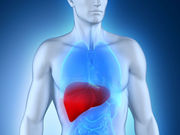Electrolyte Issues With Chronic Alcohol Use Span Social Spectrum
Telltale signs of chronic alcohol use are large drops in plasma phosphate, magnesium, potassium, calcium
Pay for Performance Cuts Mortality in Diabetes Patients
Program associated with lower risk for mortality, but not cancer incidence
Liver Cancer Remains a Major Public Health Burden Globally
Findings can be used to guide liver cancer prevention efforts
IDSA: Retail Meat May Be a Transmission Source for UTIs
Almost one-fourth of retail poultry contains E. coli strains associated with urinary tract infections
Increased Heart Rate in Response to Viewing Hockey Games
Viewing live game equivalent to vigorous physical stress; televised game equivalent to moderate stress
Addition of DPP4i to AGI Reduces HbA1c in T2DM
Greater drop in HbA1c with DPP4i added to alpha glucosidase inhibitor, with no increase in weight
Post-MI, One in Four Detached From Employment After 1 Year
Heart failure, diabetes mellitus, and depression are significant predictors of detachment
Night Shift Tied to Increased Odds of Abdominal Obesity
Increased risk for permanent night workers compared with rotating night workers
Mid-Adulthood HTN Tied to Higher Dementia Risk in Women
Midlife onset of hypertension predicts 73 percent higher dementia risk versus stable normotension
Obesity Screening Recommended for Midlife Women
PCPs should address barriers to adoption of healthy lifestyle measures in postmenopausal women



















